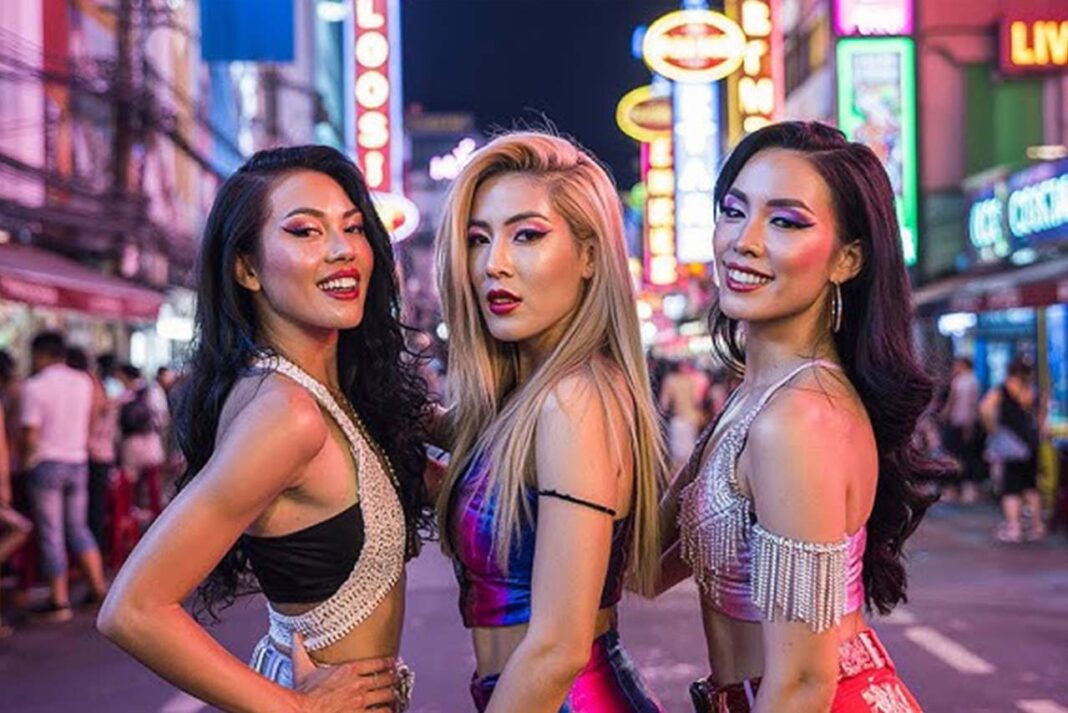Thailand, located in Southeast Asia, has a comparatively more open social structure regarding gender diversity. The kathoey—internationally known as ladyboy—has long existed as both a traditional and modern aspect of Thai culture. While this identity shares certain similarities with the Western notion of trans women, it carries a unique cultural and historical background that reflects Thailand’s distinctive understanding of gender.
However, visibility does not necessarily mean acceptance. Ladyboys in Thailand may be admired and celebrated in entertainment and tourism industries while simultaneously facing prejudice and stereotyping in daily life (Scuzzarello & Statham, 2022). Particularly in rural or conservative regions, kathoey individuals still experience discrimination. This tension between admiration and marginalization lies at the heart of their identity development—balancing authentic self-expression with societal constraints.
The Glitter Of The Stage: The Ladyboy Show Culture
One of Thailand’s most recognizable cultural exports is its cabaret and performance culture, featuring renowned venues such as Calypso Cabaret and Alcazar Show in Pattaya. These spectacular performances—filled with music, costumes, and choreography—represent more than entertainment. They are performative affirmations of identity.
On stage, kathoey performers embody confidence, grace, and femininity, asserting both personal visibility and collective recognition. Käng (2012) argues that these performances serve as identity validation, allowing kathoey individuals to meet their psychological needs for visibility and social affirmation.
Yet, this empowerment coexists with objectification. Under the tourist gaze, performances risk being reduced to “exotic spectacles”, overshadowing the performers’ lived realities and reinforcing stereotypical views. This creates a psychological tension between self-perception and external expectation—between authentic identity and its commercialization.
Tourism And Economic Pressures
Thailand’s thriving tourism industry offers economic opportunities for ladyboys, particularly in entertainment and hospitality sectors. While this can provide financial independence and self-expression, it also imposes economic and social constraints.
The commodification of gender expression risks reducing identity into a marketable performance. Research shows that many Thai ladyboys report early awareness of their feminine identity but face family and school pressures to suppress it (Bumphenkiatikul et al., 2024). Such repression often leads to identity confusion, anxiety, and depression during adolescence.
Although stage performances may later offer autonomy, they also bring constant public scrutiny, which can cause emotional fatigue. Thus, while visibility creates empowerment, it can simultaneously amplify self-monitoring and psychological strain—reflecting a paradox where being seen becomes both liberating and exhausting.
Identity And Psychological Resilience
Navigating between performance and authenticity, ladyboys face societal expectations, economic challenges, and internalized stereotypes. Despite these pressures, many demonstrate remarkable psychological resilience.
According to Lyu et al. (2021), Thai ladyboys often report occupational satisfaction through their artistic and social expression, though this stability remains fragile. Their resilience is supported by several adaptive strategies, including:
-
Building community and social support networks
-
Expressing identity through art, aesthetics, and digital media
-
Transforming performance into a tool for empowerment (Kirdnark, 2025)
These strategies help sustain emotional balance and self-coherence, transforming visibility into strength rather than vulnerability.
The Psychological Shadow Of Exoticization
Global tourism and media frequently romanticize ladyboy performances as exotic spectacles. This external gaze can shift the meaning of gender identity from a personal lived experience to a marketed symbol mediated by others’ expectations.
Such exoticization creates internal conflict between authentic selfhood and performative identity, leading to psychological strain. While tourism can enhance economic stability and representation, it also risks reinforcing stereotypes and limiting social acceptance.
The story of Thailand’s ladyboys thus reveals a delicate psychological balance—between freedom and conformity, visibility and vulnerability, empowerment and objectification.
The Strength Of An Identity
To be kathoey in Thailand is more than to occupy a social role—it is a form of psychological resistance and self-definition. Behind the sequins and lights of the stage lies a profound narrative of resilience and self-determination.
Each performance becomes not merely a show but a statement of existence, merging art and survival. Through their visibility, ladyboys illuminate the complex interplay between identity, culture, and psychological endurance, challenging societal stereotypes and asserting the human right to self-expression.
References
Bumphenkiatikul, T., Pechdhanarak, S., & Kittisuksathit, S. (2024). Transgender experiences and family dynamics among Thai kathoey youth. Journal of Gender Studies, 33(1), 45–60. https://doi.org/10.1080/19317611.2024.2383966
Käng, D. (2012). Kathoey and the politics of gender in Thailand. Chiang Mai University Press.
Lyu, B., Li, W., Xu, M., Chen, H., & Yang, Y. (2021). All normal occupations are sunny and joyful: Qualitative analysis of Thai ladyboys’ occupational wellbeing. Psychology Research and Behavior Management, 14, 2197–2208. https://doi.org/10.2147/PRBM.S340209
Scuzzarello, S., & Statham, P. (2022). Transgender kathoey socially imagining relationships with Western men in Thailand: Aspirations for gender affirmation, upward social mobility, and family acceptance. Advances in Southeast Asian Studies, 15(2), 195–212.
Kirdnark, T. (2025). Paid to live my own life: Trans women influencers and the politics of self-representation in Thailand. Cultural Studies Review, 31(3), 201–220.


